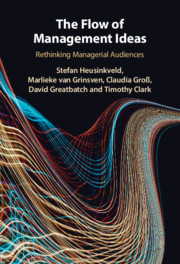Refine search
Actions for selected content:
9 results
7 - Managerial Audiences in Organisational Contexts
-
- Book:
- The Flow of Management Ideas
- Published online:
- 22 May 2021
- Print publication:
- 10 June 2021, pp 141-160
-
- Chapter
- Export citation
1 - The Flow of Management Ideas
-
- Book:
- The Flow of Management Ideas
- Published online:
- 22 May 2021
- Print publication:
- 10 June 2021, pp 1-21
-
- Chapter
- Export citation
6 - Understanding Audience Dynamism
-
- Book:
- The Flow of Management Ideas
- Published online:
- 22 May 2021
- Print publication:
- 10 June 2021, pp 114-140
-
- Chapter
- Export citation
3 - Creating a Positive Atmosphere among the Audience
-
- Book:
- The Flow of Management Ideas
- Published online:
- 22 May 2021
- Print publication:
- 10 June 2021, pp 53-70
-
- Chapter
- Export citation
8 - Managerial Audiences and Fan Involvement
-
- Book:
- The Flow of Management Ideas
- Published online:
- 22 May 2021
- Print publication:
- 10 June 2021, pp 161-186
-
- Chapter
- Export citation
5 - Defining Audience Orientations
-
- Book:
- The Flow of Management Ideas
- Published online:
- 22 May 2021
- Print publication:
- 10 June 2021, pp 87-113
-
- Chapter
- Export citation
9 - Conclusion
-
- Book:
- The Flow of Management Ideas
- Published online:
- 22 May 2021
- Print publication:
- 10 June 2021, pp 187-194
-
- Chapter
- Export citation
4 - Conveying the Applicability of Ideas to Audience Members
-
- Book:
- The Flow of Management Ideas
- Published online:
- 22 May 2021
- Print publication:
- 10 June 2021, pp 71-86
-
- Chapter
- Export citation

The Flow of Management Ideas
- Rethinking Managerial Audiences
-
- Published online:
- 22 May 2021
- Print publication:
- 10 June 2021
